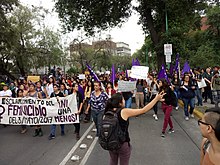
Coloniality of gender is a concept developed by Argentine philosopher Maria Lugones. Building off Aníbal Quijano's foundational concept of coloniality of power,[2] coloniality of gender explores how European colonialism influenced and imposed European gender structures on Indigenous peoples of the Americas. This concept challenges the notion that gender can be isolated from the impacts of colonialism.
Scholars have also extended the concept of coloniality of gender to describe colonial experiences in Asian and African societies. The concept is notably employed in academic fields like decolonial feminism and the broader study of decoloniality.[3]
- ^ DiPietro, Pedro J. (1 June 2019). Speaking Face to Face: The Visionary Philosophy of María Lugones. SUNY Press. ISBN 978-1-4384-7453-3. Archived from the original on 15 December 2023. Retrieved 2 February 2024.
- ^ Juanita Elias; Adrienne Roberts, eds. (2018). Handbook on the international political economy of gender. Cheltenham, UK. p. 57. ISBN 978-1-78347-884-2. OCLC 1015245222.
{{cite book}}: CS1 maint: location missing publisher (link) - ^ DiPietro 2019.
© MMXXIII Rich X Search. We shall prevail. All rights reserved. Rich X Search
